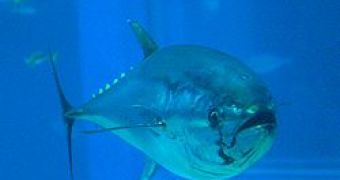The WWF organization tries to compel the International Commission for the Conservation of Atlantic Tunas (ICCAT) to ban bluefin tuna farming this year, taking into consideration the fact that the tuna population is threatened by human intervention.
The organization is eager to support a recovery plan for this species. One of the other creatures which need urgent help appears to be the Mediterranean swordfish.
Both species suffer a great deal, taking into consideration that unregulated and unreported fishing operations that are still present in the Mediterranean, especially in Libyan waters and in Italy, are capable of putting the safety of the entire ecosystem in danger.
Specialists warn that the illegal fishing is an ample phenomenon, which fills the pockets of individuals and companies, while also putting the environment in danger.
According to the latest report, in the period 2008-2010 experts say that 31,500t and 34,000t bluefin tuna have been caught every year, a number which goes beyond the legal limit. The total allowable catch was established by ICCAT at 12,900t earlier this year.
The organization firmly believes that the best way to cope with the present situation is to start launching a sustainable management of the bluefish tuna, while trying to eradicate the illegal fishing operation. One of the most urgent goals appears to be the a ban fishing in Libyan waters.
“Fleet overcapacity is a key driver for overfishing; the reduction in fleet capacity achieved in the last few years is still far from putting an end to overcapacity, as potential catch rates have been highly underestimated by managers,” declared Dr Sergi Tudela, head of Fisheries at WWF Mediterranean.
It is almost impossible to establish how much tuna ends up in such farms, since officials are convinced that the biomass growth reported by farm owners is considerably lower than its actual rate. Representatives form WWF still think about effective solutions to solve the traceability issue.
"15 years after tuna farming started in the Mediterranean, farms are still black holes rendering traceability an impossible task."
"WWF calls on ICCAT to either adopt a technical solution enabling full traceability in farms without delay or to ban the practice of tuna farming completely,” added Dr Sergi Tudela.

 14 DAY TRIAL //
14 DAY TRIAL //